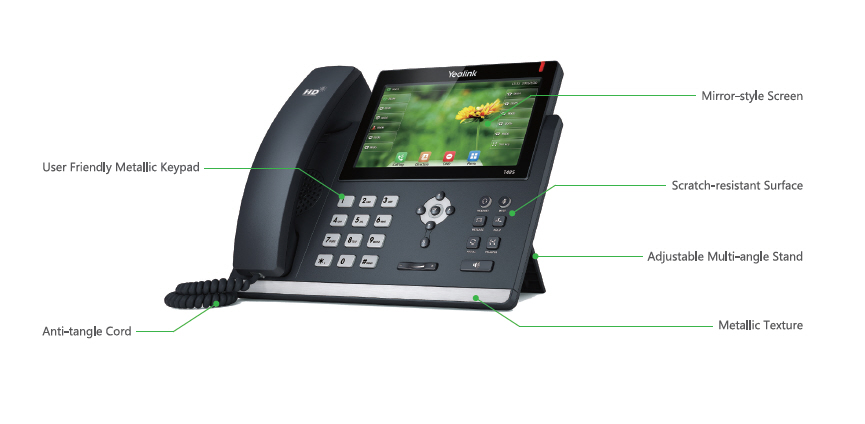Introduction
In today's fast-paced business environment, communication is paramount. Traditional phone systems are gradually being overshadowed by modern technology, particularly Voice over Internet Protocol (VoIP) phone systems. This article dives deep into the intricacies of VoIP phone systems, what they entail, their advantages and disadvantages, and their impact on businesses. Whether you're a small business owner or part of a large corporation, understanding VoIP phone systems could be the key to enhancing your communication strategy.


VoIP Phone Systems Explained: What You Need to Know
What is VoIP?
Voice over Internet Protocol, commonly referred to as VoIP, is a technology that allows you to make voice calls using the internet instead of traditional telephone lines. By converting your voice into data packets and sending them through the internet, VoIP facilitates seamless communication that often comes with lower costs and added features.
How Does VoIP Work?
VoIP technology works by digitizing analog voice signals into data packets. Here’s a simplified breakdown:
Voice Conversion: When you speak into a VoIP-enabled device, your voice is converted into digital data. Data Transmission: The digital data is then transmitted over the internet using IP networks. Reception and Translation: At the receiving end, the digital data is converted back into audio signals so that the recipient can hear your voice.This method of communication offers numerous benefits over traditional telephony.
Benefits of Using VoIP Phone Systems
Cost-Effective Communication
One of the most significant advantages of using VoIP phone systems lies in cost savings. Traditional phone services often come with hefty fees for long-distance calls and additional features. In contrast, VoIP providers typically offer competitive pricing structures that significantly reduce costs.
Scalability and Flexibility
VoIP phone systems are inherently scalable, making them an attractive option for businesses of all sizes. As your organization grows, adding new users or features can be done without the need for extensive hardware changes.
Common Features of VoIP Phone Systems
Call Forwarding
This feature allows users to redirect incoming calls to another number, whether it's a mobile device or another office line.
Voicemail to Email
With this functionality, voicemails can be transcribed and sent directly to your email inbox for easier management.
Video Conferencing
Many VoIP systems come equipped with video conferencing capabilities, allowing teams spread across various geographical locations to connect visually.
Choosing the Right VoIP Phone System for Your Business
Factors to Consider When Selecting a VoIP Provider
When it comes time to choose a VoIP provider for your business needs, several factors should be taken into account:
Reliability
Ensure that the provider guarantees uptime and has robust infrastructure in place.
Customer Support
Opt for providers who offer 24/7 customer support in case issues arise.
Pricing Plans
Evaluate different pricing models and select one that best fits your budget while offering necessary features.
User Reviews
Look at testimonials from other customers to gauge satisfaction levels with service quality and reliability.
Implementing a VoIP Phone System: Best Practices
Transitioning from a traditional system to a VoIP phone system may seem daunting; however, following best practices can ease this process:
Conduct Network Assessment

Choose Quality Hardware
Invest in high-quality headsets or phones designed specifically for use with VoIP.
Train Employees
Provide adequate training so that employees feel comfortable using new technology effectively.
VoIP Phone System Security Concerns
Understanding Security Risks on VoIP Networks
While there are many advantages associated with implementing a VoIP system, certain security risks must be acknowledged:
- Data Interception: Without proper encryption measures in place, cybercriminals may intercept calls. DoS Attacks: Denial-of-service attacks can overwhelm the network and disrupt service availability. Eavesdropping: Poorly configured networks may allow unauthorized access to sensitive conversations.
Best Practices for Securing Your VoIP System
To mitigate these risks effectively:
Use Strong Encryption Techniques: Implement secure protocols like SRTP (Secure Real-Time Transport Protocol). Regularly Update Software: Keep all software up-to-date to protect against vulnerabilities. Configure Firewalls Appropriately: Ensure firewalls are set up correctly to restrict unauthorized access while allowing legitimate traffic through.VoIP Phone Systems vs Traditional Telephone Systems: A Comparative Analysis
| Feature | VoIP Phone Systems | Traditional Telephone Systems | |---------------------------|-----------------------------|-------------------------------| | Cost | Lower operational costs | Higher call charges | | Scalability | Easily scalable | Limited scalability | | Mobility | Mobile options available | Typically location-bound | | Advanced Features | Comprehensive features | Limited features |
The comparison above highlights clear distinctions between these two types of communication technologies which could significantly influence decision-making processes when selecting a system suitable for your organization.
Case Studies on Successful Implementation of VoIP Technology in Businesses
Numerous businesses have successfully transitioned from traditional telephone systems to modern-day solutions provided by various providers like RingCentral or Vonage:
- A medium-sized retail chain reported saving up to 30% on their monthly telecom bill after switching. An IT startup improved employee collaboration through integrated video conferencing features offered by their chosen provider—showcasing how tailored solutions address specific business needs efficiently!
Common Misconceptions About VoIP Phone Systems
Misconception 1: “VoIP Is Only Suitable for Large Organizations”
Many believe that only large enterprises can take full advantage of advanced capabilities provided by modern telecommunications technologies like Voice over IP; however:
Reality:
Small businesses can also benefit immensely through reduced costs while accessing similar functionalities tailored towards enhancing customer engagement levels!
Misconception 2: "Quality Will Suffer Compared To Traditional Phones"
Some skeptics argue about perceived quality issues arising from utilizing internet connectivity rather than dedicated lines; yet,
Reality:
With advancements made within broadband infrastructure alongside improved codecs ensuring clearer sound transmission—quality concerns should no longer deter companies from embracing this innovation!
FAQs About VoIP Phone Systems
1. What Are Basic Requirements For Implementing A VoIP System?
To implement a successful Voice over Internet Protocol setup:
- Reliable internet connection Quality hardware such as IP phones & headsets Properly configured network infrastructure
2. Can I Use My Existing Phones With A New Voip System?
Yes! Many providers offer adapters enabling traditional analog phones compatibility with modern setups—allowing seamless transitions without needing complete replacements!
3. How Can I Ensure Quality Calls Over A VOip Network?
Ensuring quality involves:
- Prioritizing bandwidth usage specifically designated for voice traffic Employing QoS (Quality of Service) protocols
4. Is It Possible To Keep My Current Number When Switching To VOip?
Absolutely! Most reputable providers facilitate number portability during transitions—allowing you continuity https://open.substack.com/pub/simonhuxf549/p/navigating-compliance-issues-with?r=4ytfyn&utm_campaign=post&utm_medium=web&showWelcomeOnShare=true without disruption unnecessarily!
5. Does A VOip System Require Ongoing Maintenance?
Minimal ongoing maintenance is typically needed compared with traditional systems; however regular updates/upgrades will enhance functionality & security measures accordingly!
6. Are There Any Hidden Fees Associated With VOip Services?
While many providers advertise competitive pricing plans—always read fine print thoroughly as some may impose additional charges for specific services/features beyond basic packages offered initially!
Conclusion
In conclusion, understanding "VoIP Phone Systems Explained: What You Need to Know" equips individuals and businesses alike with tools necessary not just survive but thrive within today’s competitive landscape driven largely by innovations surrounding telecommunications technologies! Transitioning towards utilizing efficient platforms enables enhanced connectivity while streamlining operations effectively—creating opportunities where previously none existed before!
Embracing change isn’t merely an option anymore; it’s imperative if organizations wish not only remain relevant but excel among competitors striving similarly toward progress too!